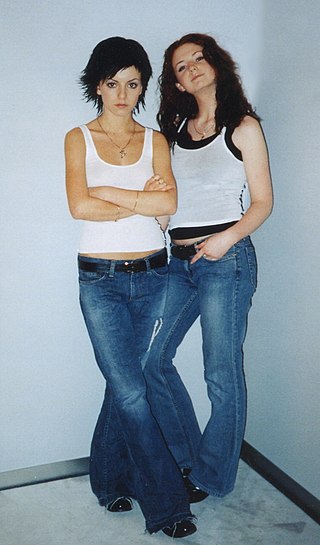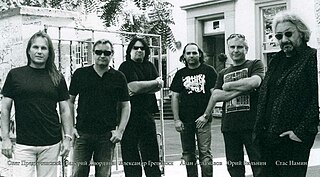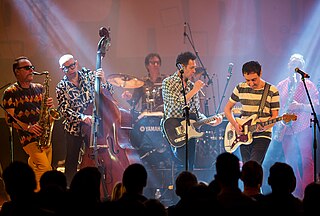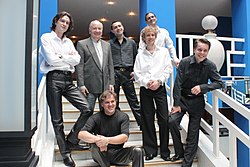
t.A.T.u. were a Russian pop duo consisting of Lena Katina and Julia Volkova. The two started out as part of the children's musical group Neposedy before being managed by producer and director Ivan Shapovalov and signing with Russian record label Neformat. t.A.T.u.'s debut album 200 Po Vstrechnoy (2001) was a commercial success in Eastern Europe, and that resulted in the duo signing with Interscope Records to release its English-language counterpart, 200 km/h in the Wrong Lane (2002). The album was certified platinum by the IFPI for one million copies sold in Europe and became the first album by a foreign group to reach number one in Japan. It was also certified gold in the United States and included the international hits "All the Things She Said" and "Not Gonna Get Us". The duo represented Russia in the Eurovision Song Contest 2003 with the song "Ne ver, ne boysya", finishing third. t.A.T.u. is one of the few Russian performers who have achieved international success along with Alla Pugacheva and Anna Netrebko.

Viktor Robertovich Tsoi was a Soviet singer-songwriter and actor who co-founded Kino, one of the most popular and musically influential bands in the history of Russian music.

Alla Borisovna Pugacheva is a Russian singer and songwriter, actress. Her career began in 1965 and continues to this day, although she retired from performing in 2010 after the international concert tour "Dreams of Love". For her "clear mezzo-soprano and a full display of sincere emotions", she enjoys an iconic status across the former Soviet Union as the most successful Soviet performer in terms of record sales and popularity. For several decades, Pugacheva was a sex symbol, a style icon, an inspiration for Soviet women and a heroine of Russian tabloids. In the media, Pugacheva has been called "the Queen of Russian pop music". Pugacheva is one of the few Russian performers who has achieved international success, along with Anna Netrebko and t.A.T.u.

Tsvety is a Soviet and Russian rock band that, according to Itogi magazine, "started all Russian alternative culture". It was one of the first bands to introduce rock music to the Soviet show business.

Gorky Park, aka GP, or Парк Горького is a Soviet and Russian hard rock band formed in 1987 by musician, composer and producer Stas Namin at his producing centre SNC in Moscow. It is the only Soviet and Russian band to have some success on the MTV and Billboard charts and become world famous.
Kino is a Russian rock band formed in Leningrad in 1981. The band was co-founded and headed by Viktor Tsoi, who wrote the music and lyrics for almost all of the band's songs, until his death in 1990. Over the course of eight years, Kino released over 90 songs spanning over seven studio albums, as well as releasing a few compilations and live albums. The band's music was also widely circulated in the form of bootleg recordings through the underground magnitizdat distribution scene. Viktor Tsoi died in a car accident in 1990. Shortly after his death, the band broke up after releasing their final album, consisting of songs that Tsoi and the group were working on in the months before his death.

Lyube is a Russian rock band from Lyubertsy, a city in Moscow Oblast. Lyube's music is a mixture of several genres, with influences from both Russian folk music, rock, Russian chanson, and Soviet military songs. The band was founded in 1989, and since then have released sixteen albums. Lyube's producer and main songwriter is Igor Matviyenko.

Yury (George) Chernavsky is a Russian producer, composer and songwriter. Chernavsky is a member of performance rights organisations such as GEMA, BMI, and RAO, and has also been recognized as an Honored Artist of the RSFSR.

Bravo is a rock and roll band founded in 1983 in Moscow, Russia by guitarist Evgeny Khavtan.

David Fyodorovich Tukhmanov PAR is a Soviet and Russian composer. People's Artist of Russia (2000), State Prize of Russian Federation.

Leonid Petrovich Derbenyov was a Russian poet and lyricist widely regarded as one of the stalwarts of the 20th century Soviet and Russian pop music.

Leonid Nikolayevich Agutin is a Russian pop musician and songwriter, Meritorious Artist of Russia (2008). He has been active since the 1990s. He has released ten albums and three compilation albums.

Monologue of Love is the studio album by Soviet singer Sofia Rotaru, released in 1987 by Melodiya. The long play album was simultaneously released for the Soviet and international market. The album includes songs performed in Russian with new rock style arrangements by leading Soviet pop and rock bands: Vesyolye Rebyata, Forum, Chervona Ruta. This album is a soundtrack album to the movie Monologue of Love released in 1986.
VIA is an abbreviation for Vocal and Instrumental Ensemble. It is the general name used for popular music bands that were formally recognized by the Soviet government from the 1960s to the 1980s.

Yulia Olegovna Volkova, better known by the alternative spelling of Julia, is a Russian singer best known for being a member of the Russian girl group t.A.T.u., along with Lena Katina. Formed in Moscow, Russia by Ivan Shapovalov in March 1999, the group signed a record deal with Universal Music Russia, and eventually Universal's sub-label Interscope Records in 2001.

Lubov' Ogromnaya Strana is the first long-play studio album by Soviet VIA band Vesyolye Rebyata, recorded on the Soviet monopolist label Melodiya and released in summer 1974. In 2009, the album was re-issued on CD featuring completely remastered tracks with an alternate track-listing and multiple bonus material. The album is considered to be a Soviet rock classics and the best LP of the band.
Nina Brodskaya is a Soviet singer (soprano), popular in the 1960s and 1970s.

Alexey Sergeevich Glyzin is a Soviet and Russian pop singer and actor. He has received various awards, including Honored Artist of Russia (2006), and the Chanson of the Year award (2016).

Zerkalo dushi is the debut studio album by Russian soviet singer Alla Pugacheva released in the USSR in February 1978. Later the album was released as two separate records.

Arlekino i drugiye is the second studio album by Russian Soviet singer Alla Pugacheva released in 1979 by Melodiya.

















